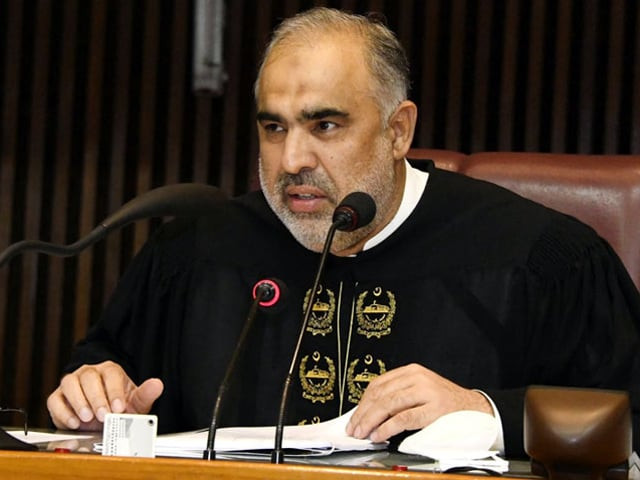Will follow law on dissident lawmakers’ votes: Qaiser
Says it is opposition’s ‘constitutional right’ to file a no-confidence motion against him as well

National Assembly Speaker Asad Qaiser on Monday maintained that he would act in accordance with the law on the issue of dissident parliamentarians’ votes on the no-confidence motion filed by the joint opposition against Premier Imran Khan last week.
Earlier, in a speech, Qaiser had defended PM Imran, saying the PTI members would fight with full force the opposition’s move, which he said would be unsuccessful.
The opposition parties termed the conduct of the NA speaker “partisan” and demanded that he should not chair the session on the day of voting on the no-trust move.
In an interaction with media at the Parliament House on Monday, Qaiser was asked whether he had sought the advice of the National Assembly's legislation branch on the potential rejection of votes cast by any parliamentarian who cross the floor.
"Let me make this clear, whatever I will do will be in accordance with the law and rules. What the government and opposition are doing is not my concern," he said.
"I have definitely sought legal opinions and it is my job to discuss this with legal experts."
He, however, denied writing any letter to the NA legislation branch on the issue.
Qaiser's comments follow days-long speculation and discussions on his authority to reject dissident MPs votes on the no-confidence motion against the premier.
The issue was first highlighted when Interior Minister Sheikh Rashid during a news conference said that the NA speaker had the right to disqualify the members who "crossed the floor" and that "no one could challenge that".
The PTI's members vindicated the stance on basis of Article 63-A of the constitution.
According to the article, a lawmaker can be disqualified on grounds of defection if he "votes or abstains from voting in the House contrary to any direction issued by the parliamentary party to which he belongs, in relation to election of the prime minister or chief minister; or a vote of confidence or a vote of no-confidence; or a money bill or a Constitution (amendment) bill".
Some legal experts are of the view that Article 63-A does not authorise the NA speaker to refrain a parliamentarian from voting but only to penalise a dissident lawmaker after the voting ends.
Qaiser said he had been consulting the NA Secretariat about convening the session on the no-trust vote, emphasising that it would be summoned within the stipulated time and according to the constitution.
“The date for the [NA] session will be finalised in a day or two.”
To another question about the opposition’s announcement of submitting a no-trust motion against him, the NA speaker said it was the “opposition’s constitutional right to file the motion”.
“I welcome the decision,” he stated.



















COMMENTS
Comments are moderated and generally will be posted if they are on-topic and not abusive.
For more information, please see our Comments FAQ